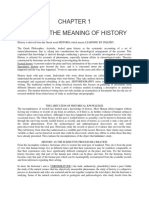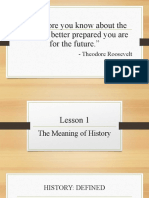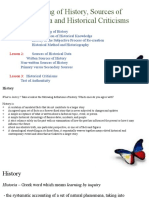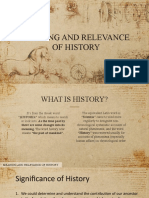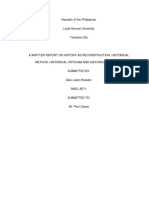0 ratings0% found this document useful (0 votes)
14 viewsRPH 1
RPH 1
Uploaded by
Charish BulotanoCopyright:
© All Rights Reserved
Available Formats
Download as PDF, TXT or read online from Scribd
RPH 1
RPH 1
Uploaded by
Charish Bulotano0 ratings0% found this document useful (0 votes)
14 views11 pagesOriginal Title
RPH_1
Copyright
© © All Rights Reserved
Available Formats
PDF, TXT or read online from Scribd
Share this document
Did you find this document useful?
Is this content inappropriate?
Copyright:
© All Rights Reserved
Available Formats
Download as PDF, TXT or read online from Scribd
Download as pdf or txt
0 ratings0% found this document useful (0 votes)
14 views11 pagesRPH 1
RPH 1
Uploaded by
Charish BulotanoCopyright:
© All Rights Reserved
Available Formats
Download as PDF, TXT or read online from Scribd
Download as pdf or txt
You are on page 1of 11
READINGS IN PHILIPPINE HISTORY - CHAPTER 1:
THE MEANING OF HISTORY, SOURCES
OF HISTORICAL DATA, & HISTORICAL
CRITICISMS
HISTORY
derived from the Greek word Historia which
means “learning by inquiry”
it is usually referred to as accounts of
phenomena, especially human affairs in
chronological order.
Historians - individuals who write about history
Historiography - is the practice of historical
writing; the traditional method in doing historical
research that focus on gathering of documents
from different libraries and archives to form a
pool of evidence needed in making a descriptive
or analytical narrative.
Theories Constructed by
Historians
Factual History - presents the basic and
plain information to the reader with the
emphasis only of “who”, “what”, and “where”
of history
Speculative History - goes beyond dates,
places, persons, events because it attempts
to explain the “how” and “why” of events. It
discusses the causes and effects of such
happening which resulted to another face
of change
LIMITATION OF HISTORICAL
KNOWLEDGE
The whole history of the past (called history-as actuality)
can be known to a historian only through the surviving
records (history-as record) and most of the history-as
record is only a tiny part of the whole phenomena
Historians study the records or evidences that survived
the time. However, their claims may remain variable as
there can be historical records that could be discovered,
which may affirm or refute those that they have already
presented. This explains the “incompleteness” of the
“object” that historians study.
HISTORY AS THE SUBJECTIVE PROCESS
OF RECREATION
Historians strive to restore the total part of
mankind. Their aim is VERISIMILITUDE
(the truth, authenticity, plausibility) about
a perished past. The study of history is a
subjective process as documents and relics
are scattered and do not together
comprise the total object that the historian
is studying.
HISTORICAL METHOD AND
HISTORIOGRAPHY
Historical Method - the process of critically
examining and analyzing the records and survivals
of the past.
Historiography - the imaginative reconstruction of
the past from the data derived by that process.
Historical analysis is also an important element of
historical method. Through this, historians:
(1) select the subject to investigate;
(2) collect probable sources of information on
the subject;
(3) examine the sources’ genuineness, in part of
in whole; and
(4) extract credible “particulars” from the
sources.
SOURCES OF HISTORICAL DATA
Historical data are sourced from artifacts that have
been left by the past which can either be relics or
remains, or the testimonies of witnesses to the past.
Relics or Remains - offer researchers a clue
about the past.
Testimonies of Witnesses - whether oral or
written, may have been created to serve as
records or they might have created for some
other purposes. All these describe an event, such
as the record of a property exchange, speeches,
and commentaries.
Examples of RELICS
Examples of REMAINS
Examples of TESTIMONIES OF WITNESSES
SOURCES OF HISTORICAL DATA
The historians deals with the dynamic or genetic
(the becoming) as well as the static (the being)
and aims at being interpretative (explaining why
and how things happened and were interrelated)
as well as descriptive (telling what happened,
when, and where, and who took part).
The lives of human beings can be assumed from
the retrieved artifacts, but without further
evidence of the human contexts of these artifacts
can never be recaptured with any degree of
uncertainty
You might also like
- Introduction To HistoryDocument9 pagesIntroduction To HistoryBea Kulin100% (1)
- Readings in Phil History Chapter 1Document18 pagesReadings in Phil History Chapter 1Sheena Tan67% (6)
- GE 8 - Handouts For First ExamDocument3 pagesGE 8 - Handouts For First ExamPhaul QuicktrackNo ratings yet
- Ph.D. SOPDocument3 pagesPh.D. SOPtom_boe87No ratings yet
- Carnival ProjectDocument16 pagesCarnival Projectapi-397509742100% (1)
- RIPH ReviewerDocument26 pagesRIPH ReviewerAbigail VillalvaNo ratings yet
- The Meaning of History, Sources of Historical Data and Historical Criticism (Notes)Document7 pagesThe Meaning of History, Sources of Historical Data and Historical Criticism (Notes)Ebab YviNo ratings yet
- Lesson 1: - The Meaning of HistoryDocument5 pagesLesson 1: - The Meaning of HistoryJean Carmelette BalalloNo ratings yet
- Reading in Philippine History: Lesson 1Document13 pagesReading in Philippine History: Lesson 1AMOLAR, ROSSEL JOY C.No ratings yet
- RPH Intro 1 2 3Document131 pagesRPH Intro 1 2 3Papa, Jeriemar S.No ratings yet
- Introduction To RPHDocument6 pagesIntroduction To RPHJPNo ratings yet
- Lesson 1-1 - The Meaning of HistoryDocument3 pagesLesson 1-1 - The Meaning of HistoryEUREKA PEARL PAIRATNo ratings yet
- Chapter 1 RPH Lesson 1meaning of HistoryDocument2 pagesChapter 1 RPH Lesson 1meaning of HistoryyashurasamadesuNo ratings yet
- The Limitation of Historical KnowledgeDocument2 pagesThe Limitation of Historical KnowledgeJulie-Mar Valleramos LabacladoNo ratings yet
- Readings in Philippine HistoryDocument14 pagesReadings in Philippine HistoryVenice LayaguinNo ratings yet
- Readings in Philippine HistoryDocument2 pagesReadings in Philippine HistoryZhel CarolinoNo ratings yet
- Toaz - Info Readings in Phil History Chapter 1 PRDocument18 pagesToaz - Info Readings in Phil History Chapter 1 PRJohn paul GamayoNo ratings yet
- Lesson 1:: Meaning of HistoryDocument13 pagesLesson 1:: Meaning of HistorykillsamonteNo ratings yet
- What Is History? What Is Histpriography? Old/traditional Understanding New UnderstandingDocument2 pagesWhat Is History? What Is Histpriography? Old/traditional Understanding New UnderstandingCy PrivadoNo ratings yet
- Book 1Document4 pagesBook 1lucy faithNo ratings yet
- History 101 Reading NotesDocument26 pagesHistory 101 Reading Notesjheacawayan1018No ratings yet
- The Meaning of History - 0Document15 pagesThe Meaning of History - 0Miraflor V. MacionNo ratings yet
- Readings in PH HistoryDocument119 pagesReadings in PH HistoryDevin Jake Maylas FeoNo ratings yet
- Lesson 1 History Sources of Historical Data CriticismDocument58 pagesLesson 1 History Sources of Historical Data CriticismErica MorpeNo ratings yet
- ss101 ReviewerDocument7 pagesss101 ReviewerJohn Matthew AbellaNo ratings yet
- GE8 Chapter 1 Converted 2Document61 pagesGE8 Chapter 1 Converted 2Maria Jane PerezNo ratings yet
- RPH PrelimsDocument12 pagesRPH PrelimsCATHRYN MAE GAYLANNo ratings yet
- Ge2 Reviewer LMSDocument16 pagesGe2 Reviewer LMSdeniosocNo ratings yet
- Lesson 1 HistoryDocument27 pagesLesson 1 HistoryleoviesenolayNo ratings yet
- Readings in The Phil History NotesDocument7 pagesReadings in The Phil History NotesChristaniel LangerNo ratings yet
- Why Study HistoryDocument5 pagesWhy Study HistoryBryden P. TauroNo ratings yet
- History 101Document4 pagesHistory 101jheacawayan1018No ratings yet
- LESSON 1 SOURCES AND CRITICISM IN HISTORY AutoRecoveredDocument6 pagesLESSON 1 SOURCES AND CRITICISM IN HISTORY AutoRecoveredbarangaycentro356No ratings yet
- Chapter 1 Phil HisDocument16 pagesChapter 1 Phil HisChristine NarcisoNo ratings yet
- Definition of HistoryDocument6 pagesDefinition of HistoryJaylord MedinaNo ratings yet
- Mod 2 Reading in The Philippine HistoryDocument3 pagesMod 2 Reading in The Philippine Historykhen estribelloNo ratings yet
- 001 PPT GEC102 Meaning of HistoryDocument11 pages001 PPT GEC102 Meaning of HistoryCllyan ReyesNo ratings yet
- RPH YrishDocument7 pagesRPH YrishJohn Lloyd Artuz EnriquezNo ratings yet
- Readings in Phil History Chapter 1Document17 pagesReadings in Phil History Chapter 1Google AccountNo ratings yet
- RPH 101 Chapter 3 TakeawaysDocument9 pagesRPH 101 Chapter 3 Takeawaysjasmine.angela1119No ratings yet
- Chapter IDocument5 pagesChapter IKurt Anne SanchezNo ratings yet
- Meaning and Relevance of HistoryDocument40 pagesMeaning and Relevance of HistoryJohn Karlo BaniquedNo ratings yet
- Reading 1 AnswersDocument69 pagesReading 1 Answersdianne simanganNo ratings yet
- Hilario Jayson Written Report in Maed 301Document6 pagesHilario Jayson Written Report in Maed 301jayson hilarioNo ratings yet
- Chapter 1 Meaning and Relevance of HistoryDocument23 pagesChapter 1 Meaning and Relevance of HistoryNicko EugenioNo ratings yet
- Chapter 1 RPHDocument17 pagesChapter 1 RPHJohn King VillasanteNo ratings yet
- Reading in The Philippine History NotesDocument3 pagesReading in The Philippine History NotesAngilyn LumabasNo ratings yet
- Historical Methods and Reliable Sources (Diego A. Odchimar III, 2023)Document75 pagesHistorical Methods and Reliable Sources (Diego A. Odchimar III, 2023)Diego A. Odchimar IIINo ratings yet
- Introductiontohistory Part 1Document32 pagesIntroductiontohistory Part 1rahimabegum7489No ratings yet
- 001 PPT GEC102 Meaning of HistoryDocument11 pages001 PPT GEC102 Meaning of HistoryRESTY FERNANDEZNo ratings yet
- Intro To History I - ArebazDocument17 pagesIntro To History I - Arebazemary00762No ratings yet
- READING PHILIPP-WPS OfficeDocument16 pagesREADING PHILIPP-WPS Officearianna92305No ratings yet
- Document Philippine HistoryDocument7 pagesDocument Philippine HistoryMark Noel GalindoNo ratings yet
- Lesson 1 History Sources of Historical Data CriticismDocument58 pagesLesson 1 History Sources of Historical Data CriticismAiron CabañasNo ratings yet
- The Meaning of HistoryDocument4 pagesThe Meaning of Historyxuxi dulNo ratings yet
- Historical Method and Historical Sources Written ReportDocument7 pagesHistorical Method and Historical Sources Written ReportMarc Jalen ReladorNo ratings yet
- Common Course FinalDocument62 pagesCommon Course FinalLetaNo ratings yet
- Chapter 1Document11 pagesChapter 1Aljhon Sombillo TolentinoNo ratings yet
- Readings in Philippine History-Chapter 1-LemanaDocument16 pagesReadings in Philippine History-Chapter 1-LemanaKenneth DraperNo ratings yet
- Introductiontohistory Part 1Document32 pagesIntroductiontohistory Part 1speareeD :3No ratings yet
- Was Hitler a Darwinian?: Disputed Questions in the History of Evolutionary TheoryFrom EverandWas Hitler a Darwinian?: Disputed Questions in the History of Evolutionary TheoryRating: 4.5 out of 5 stars4.5/5 (2)
- Powering Jobs Census 2019Document48 pagesPowering Jobs Census 2019Vasile CiupituNo ratings yet
- Ing 11 FixDocument27 pagesIng 11 Fixgaizka mahdafikiaNo ratings yet
- Stakeholder AnalysisDocument8 pagesStakeholder AnalysisMohammad Khurshaid AhmadNo ratings yet
- DPE 104 Measurement and Evaluation: Page 1 of 10Document10 pagesDPE 104 Measurement and Evaluation: Page 1 of 10John M100% (1)
- The TQM Journal: Article InformationDocument13 pagesThe TQM Journal: Article Informationumadevi.nagiahNo ratings yet
- DBA1732Document209 pagesDBA1732Shashi Bhushan SinghNo ratings yet
- PROPOSALDocument13 pagesPROPOSALStephen MukuniNo ratings yet
- Analysis of Investment Banking Business Under TheDocument4 pagesAnalysis of Investment Banking Business Under TheMr. GowharNo ratings yet
- Effect of Different Levels of Molasses On The Germination of Inbred (NSIC RC222) Variety of Rice (Oryza Sativa)Document13 pagesEffect of Different Levels of Molasses On The Germination of Inbred (NSIC RC222) Variety of Rice (Oryza Sativa)Ping Estocada100% (1)
- Cisco ISE: Technology Partner Ecosystem: At-A-GlanceDocument2 pagesCisco ISE: Technology Partner Ecosystem: At-A-GlanceFranz Mejorada CcieNo ratings yet
- BS 812-106 Testing Aggregates - Shell Content in Coarse AggrDocument9 pagesBS 812-106 Testing Aggregates - Shell Content in Coarse AggrGasper ShirimaNo ratings yet
- Research Papers On Ready To Cook FoodDocument7 pagesResearch Papers On Ready To Cook Foodafnkknpigjqqjm100% (1)
- Innovation Management Iii Bcom (Unit Iv)Document11 pagesInnovation Management Iii Bcom (Unit Iv)Commerce DepartmentNo ratings yet
- CTM PDFDocument6 pagesCTM PDFArikus Wibowo MuhammadNo ratings yet
- O Level Sociology (2251) 1/1Document1 pageO Level Sociology (2251) 1/1mstudy123456No ratings yet
- CHED Memorandum Order # 5 (2008)Document121 pagesCHED Memorandum Order # 5 (2008)wiredpsyche100% (69)
- Changing Concept of DevelopmentDocument21 pagesChanging Concept of DevelopmentEKTANo ratings yet
- Pet Food Manufacturing Checklist Edition 9Document131 pagesPet Food Manufacturing Checklist Edition 9elflaquito80No ratings yet
- Bam ShadDocument8 pagesBam ShadShirish KumarNo ratings yet
- Value at Risk As A Tool For Mutual Funds Performance Evaluation PDFDocument6 pagesValue at Risk As A Tool For Mutual Funds Performance Evaluation PDFEka Nurmala SariNo ratings yet
- CSR Silabus Gasal 2016-17Document5 pagesCSR Silabus Gasal 2016-17Ma'ruv RulBe HazcahNo ratings yet
- MindmapDocument15 pagesMindmapstNo ratings yet
- Shakir ShaikhDocument2 pagesShakir ShaikhShakir ShaikhNo ratings yet
- Annexure BlankDocument8 pagesAnnexure BlankOm JadhavNo ratings yet
- Captain Nemo Is The Commander of TheDocument2 pagesCaptain Nemo Is The Commander of TheafizaharizNo ratings yet
- CIA Material SamplingDocument6 pagesCIA Material SamplingumasankarNo ratings yet
- PCP Regulations For Pharm.D ProgramDocument21 pagesPCP Regulations For Pharm.D ProgramAdil YousafNo ratings yet
- Sarah Hallowell Yale SOM ResumeDocument1 pageSarah Hallowell Yale SOM ResumeAnonymous aehbOkuNo ratings yet













